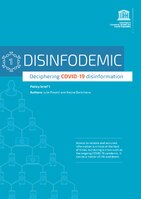
Photo from wikipedia
Significance Rapid testing with antigen tests accompanies efforts for controlling the disease dynamics in the severe acute respiratory syndrome coronavirus 2 (SARS-CoV-2) pandemic. A high willingness to carry out these… Click to show full abstract
Significance Rapid testing with antigen tests accompanies efforts for controlling the disease dynamics in the severe acute respiratory syndrome coronavirus 2 (SARS-CoV-2) pandemic. A high willingness to carry out these tests and high test literacy of potential users are needed. In four cross-sectional data collections with more than 4,000 participants, we showed that incentives can increase the willingness to undertake a test, while mandatory reporting was not perceived as a major barrier. However, participants had difficulties correctly interpreting test results. A short health communication intervention effectively reduced complacent behavior after negative test results. In sum, rapid tests have great potential to help fight the SARS-CoV-2 pandemic but only when effective health communication enables people to test and act appropriately. Severe acute respiratory syndrome coronavirus 2 (SARS-CoV-2) rapid antigen point-of-care and home tests are available to laypeople. In four cross-sectional mixed-methods data collections conducted between December 2020 and March 2021 (n = 4,026), we showed that a majority of subjects were willing to test despite mistrust and ignorance regarding rapid tests’ validity. Experimental evidence shows that low costs and access to events could increase testing intentions. Mandatory reporting and isolation after positive results were not identified as major barriers. Instead, assuming that testing and isolation can slow down the pandemic and the possibility to protect others were related to greater willingness to get tested. While we did not find evidence for risk compensation for past tests, experimental evidence suggests that there is a tendency to show less mask wearing and physical distancing in a group of tested individuals. A short communication intervention reduced complacent behavior. The derived recommendations could make rapid testing a successful pillar of pandemic management.
Journal Title: Proceedings of the National Academy of Sciences of the United States of America
Year Published: 2021
Link to full text (if available)
Share on Social Media: Sign Up to like & get
recommendations!